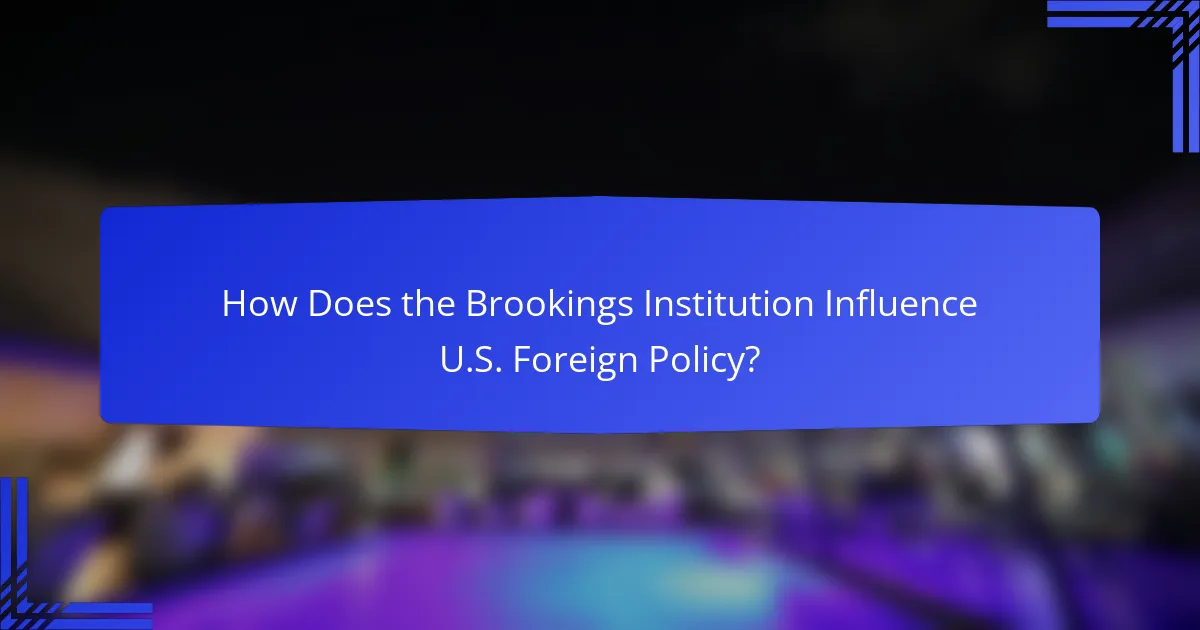The Brookings Institution significantly influences U.S. foreign policy through its rigorous research and expert analysis. By focusing on key areas such as international security, global economic policy, and human rights advocacy, Brookings provides valuable insights that inform policymakers and the public alike. Its network of influential figures, including senior fellows and former government officials, further enhances its impact on think tanks in geopolitical analysis and decisions.

How Does the Brookings Institution Influence U.S. Foreign Policy?
The Brookings Institution influences U.S. foreign policy through rigorous research, expert testimonies, comprehensive publications, and direct engagement with legislative processes. Its insights shape the decisions of policymakers and contribute to the broader discourse on international relations.
Research and Policy Recommendations
The Brookings Institution conducts extensive research that informs U.S. foreign policy decisions. By analyzing global trends and challenges, it provides actionable policy recommendations that address current issues, such as security threats and economic partnerships.
For instance, Brookings often releases reports that suggest strategies for diplomatic engagement or economic sanctions, helping lawmakers and government officials navigate complex international landscapes.
Expert Testimonies and Briefings
Brookings experts frequently provide testimonies before Congress and other governmental bodies, offering insights that can shape legislative action. These testimonies are grounded in thorough research and reflect a deep understanding of foreign policy dynamics.
Additionally, the institution organizes briefings for policymakers, ensuring that decision-makers are equipped with the latest information and analysis on pressing foreign affairs topics.
Publications and Reports
The institution publishes a variety of materials, including policy briefs, articles, and comprehensive reports that outline its findings and recommendations. These publications serve as valuable resources for both policymakers and the public, enhancing understanding of foreign policy issues.
Brookings’ reports often highlight case studies or comparative analyses, making complex topics more accessible and actionable for those involved in shaping U.S. foreign policy.
Influence on Legislative Processes
Brookings plays a significant role in influencing legislative processes by providing research and expert opinions that inform lawmakers’ decisions. Its work often leads to the drafting of legislation that aligns with its policy recommendations.
Moreover, the institution fosters relationships with key stakeholders in government, which can facilitate the adoption of its proposals into formal policy initiatives. This engagement ensures that its research has a direct impact on the legislative agenda related to foreign affairs.

What Are the Key Areas of Focus for Brookings in Foreign Policy?
Brookings focuses on several key areas in foreign policy, including international security, global economic policy, and human rights advocacy. Their research and analysis aim to inform policymakers and the public about critical global issues and effective strategies for U.S. engagement.
International Security
Brookings examines international security through the lens of military strategy, conflict resolution, and global stability. Their experts analyze threats such as terrorism, nuclear proliferation, and cyber warfare, providing insights into how the U.S. can enhance its national security while fostering international cooperation.
For instance, Brookings often discusses the implications of military interventions and the importance of diplomatic solutions. They emphasize the need for a balanced approach that combines defense capabilities with robust alliances and partnerships.
Global Economic Policy
In global economic policy, Brookings addresses issues like trade agreements, economic sanctions, and international financial systems. Their research helps to shape U.S. economic strategies that promote growth while addressing global challenges such as inequality and climate change.
Brookings frequently evaluates the impact of policies like tariffs and trade deals on both the U.S. economy and its international relationships. They advocate for policies that support fair trade practices and sustainable economic development.
Human Rights Advocacy
Brookings is committed to promoting human rights as a fundamental aspect of U.S. foreign policy. Their work highlights the importance of protecting civil liberties and advocating for democratic governance worldwide.
Through reports and policy recommendations, Brookings emphasizes the need for the U.S. to leverage its influence to support human rights initiatives. They often discuss the role of international organizations and coalitions in advancing these goals, urging policymakers to prioritize human rights in diplomatic efforts.

Who Are the Key Figures at Brookings Shaping Foreign Policy?
The Brookings Institution plays a significant role in shaping U.S. foreign policy through its influential figures, including senior fellows, former government officials, and board members. These individuals contribute their expertise and insights, impacting policy discussions and decisions at various levels of government.
Senior Fellows and Scholars
Senior fellows and scholars at Brookings are experts in international relations, economics, and security studies. They conduct research, publish reports, and provide analysis that informs policymakers and the public on critical foreign policy issues. Their work often addresses pressing global challenges such as climate change, terrorism, and trade relations.
For example, a senior fellow specializing in Middle Eastern affairs might produce a detailed report on U.S.-Iran relations, offering recommendations that could influence diplomatic strategies. Their insights are frequently sought by government agencies, think tanks, and the media.
Former Government Officials
Brookings attracts former government officials who bring practical experience and insider knowledge to the institution. These individuals often have held significant positions in the U.S. government, such as ambassadors, cabinet members, or senior advisors. Their unique perspectives help bridge the gap between academic research and real-world policy implementation.
For instance, a former Secretary of State may participate in discussions about international diplomacy, drawing on firsthand experiences to guide current policy debates. Their involvement lends credibility to Brookings’ recommendations and enhances its influence on foreign policy decisions.
Influential Board Members
The board members of Brookings include prominent figures from various sectors, including business, academia, and public service. Their diverse backgrounds and networks provide valuable connections and resources that support Brookings’ mission. These members often advocate for the institution’s initiatives and help secure funding for research projects.
Board members may also participate in high-level discussions and events, amplifying Brookings’ reach and impact on foreign policy discourse. Their engagement ensures that the institution remains relevant and responsive to the evolving geopolitical landscape.

What Role Does Brookings Play in Public Discourse on Foreign Policy?
Brookings Institution significantly influences public discourse on U.S. foreign policy through research, expert commentary, and public engagement. Its scholars provide insights that shape policy debates and inform decision-makers, making it a key player in the landscape of foreign affairs.
Media Engagement and Commentary
Brookings scholars frequently engage with various media outlets, offering expert analysis on pressing foreign policy issues. They contribute op-eds, appear on news programs, and participate in interviews, ensuring that their perspectives reach a broad audience.
This media engagement helps to frame public understanding of complex topics, such as international relations and security challenges. By providing clear and informed commentary, Brookings enhances the quality of discourse surrounding U.S. foreign policy.
Public Events and Forums
Brookings hosts numerous public events and forums that bring together policymakers, scholars, and the public to discuss foreign policy matters. These events often feature panel discussions, keynote speeches, and Q&A sessions, fostering dialogue and debate.
Participation in these forums allows attendees to engage directly with experts and gain insights into current foreign policy challenges. Additionally, these events are often streamed online, expanding their reach and impact on public discourse.

How Does Brookings Collaborate with Other Institutions?
Brookings collaborates with various institutions to enhance its influence on U.S. foreign policy decisions. These partnerships leverage expertise and resources, allowing for comprehensive research and policy recommendations.
Partnerships with Think Tanks
Brookings engages in strategic partnerships with other think tanks to share insights and develop joint initiatives. These collaborations often focus on specific policy areas, such as international relations, economic policy, or security studies. For instance, Brookings may work with organizations like the Carnegie Endowment for International Peace to produce joint reports or host events that address pressing global issues.
Such partnerships can amplify the reach of their research and provide a platform for diverse viewpoints. By pooling resources, these think tanks can conduct more extensive studies and influence policymakers more effectively.
Collaborations with Academic Institutions
Brookings collaborates with universities and research institutions to integrate academic research into policy discussions. These partnerships often involve joint research projects, workshops, and seminars that bring together scholars and policymakers. For example, Brookings may partner with universities to analyze the implications of foreign policy decisions using empirical data and theoretical frameworks.
These collaborations help bridge the gap between academia and practical policymaking, ensuring that research informs real-world decisions. Engaging with academic institutions also allows Brookings to tap into cutting-edge research and emerging ideas that can shape future policy directions.
